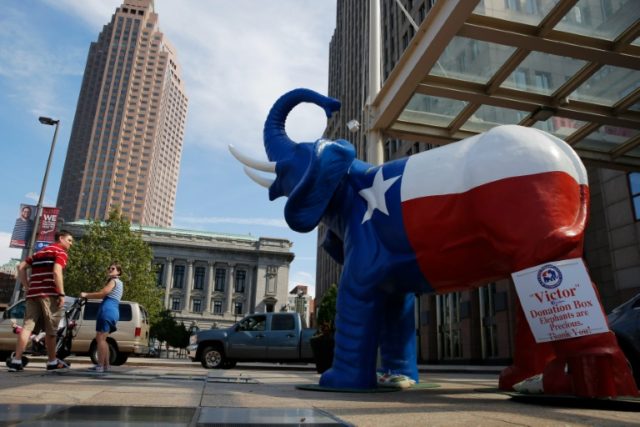Republican nominee Donald Trump’s poll numbers have slumped over the past week, in the wake of the controversy over his argument with the Khan family. Nervous Republicans have piled on the criticism (my personal favorite: the Harvard College Republicans warning that Trump is “poisoning our children“).
Trump has made mistakes, yet it is also worth remembering the huge obstacles any Republican candidate faces in a presidential election — even against a rival as flawed as Hillary Clinton.
1. The Electoral College. The Democrats have a huge advantage, owing to the fact that more of the most populous states are guaranteed. As Chris Cilizza of the Washington Post notes: “The generic Democratic nominee starts with an electoral vote lead of 140, and the Democratic nominee needs to find only 28 votes beyond that reliable base to win the presidency.” It has been that way since 1992. Trump’s pitch is that he can win New York. Only he could, but it has always been a long shot.
2. The media. It remains true that most media organizations, including Hollywood studios, function as massive super PACs for the Democratic Party. Fox News and the conservative new media are still outgunned. CNN has boosted ratings by adding a few conservative panelists, but its news coverage — cutting away from the victims of crimes by illegal aliens, or boosting the Khans over the Benghazi families — is still decidedly partisan. Trump often fights the media, but the house always wins.
3. Victimology. Trump has the Khans; Mitt Romney had Sandra Fluke and the “47 percent” remark. Fluke is an illustrative example, because the candidate never said anything about her. When the left cannot goad the Republican nominee into that kind of fight, it will find someone else — in Fluke’s case, Rush Limbaugh — to target as a symbol of the party as a whole. The controversy over Todd Akin’s abortion comments followed the same pattern. The point is that it always happens. Every time.
4. Economic growth. No matter how sluggish the economy — bad unemployment numbers, for example — the incumbent is always favored as long as overall economic growth is positive. Obama has presided over the weakest economic recovery in the post-World War II era, and growth was only 1.2% in the second quarter of this year. That is probably enough, however, to put the incumbent — in this case, Clinton as the representative of the incumbent presidential party — at a strategic advantage.
5. “History.” Obama had severe flaws that ought to have prevented him from ever coming close to the presidency: almost no achievements; a radical past; and, worst of all, membership in a racist church. Still, once he won the Iowa caucuses in 2008, he became compelling to voters as the first black candidate with a chance of winning. That trumped Clinton’s own historic candidacy — race always comes before gender in that hierarchy — but now that card is hers alone to play, and she is playing it.
In light of the above, it is clear that only extraordinary circumstances, or an extraordinary candidate, will allow Republicans to win the presidency in any given year, and especially this year.
The best case for Trump remains the reason that many voters were drawn to him in the first place: that his policies appeal to a neglected part of the electorate, and that he is willing to be provocative.
Trump is not the only candidate who could have fallen into this hole, but only a Trump might climb out of it.
Joel B. Pollak is Senior Editor-at-Large at Breitbart News. His new book, See No Evil: 19 Hard Truths the Left Can’t Handle, is available from Regnery through Amazon. Follow him on Twitter at @joelpollak.

COMMENTS
Please let us know if you're having issues with commenting.